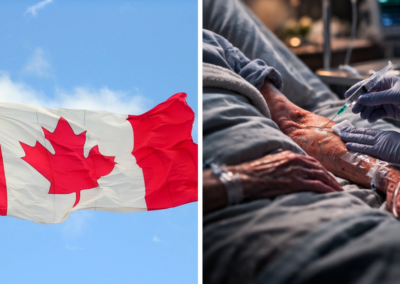The UK Health Secretary has said people are legally allowed to travel overseas for an assisted suicide during lockdown.
Conservative MP Andrew Mitchell was fearful the national lockdown in England, which was brought in to save lives, “could deter” people from ending their lives.
But, Matt Hancock told MPs today: “The new coronavirus regulations, which come into force today, place restrictions on leaving the home without a reasonable excuse; travelling abroad for the purpose of assisted dying is a reasonable excuse, so anyone doing so would not be breaking the law.”
Increasing access to suicide during crisis ‘completely inappropriate’
The Health Secretary went even further and added that the pandemic had “shone a spotlight on so many issues” and welcomed further debate on the topic. This is despite the Lord Chancellor claiming earlier this year that the UK Government has no plans to review the law on assisted suicide.
Not wanting to see another U-turn, similar to the one that introduced dangerous ‘DIY’ home abortions to the UK, pro-life MP Fiona Bruce quickly rebutted his comments by stating that increasing access to any form of suicide at this time would be completely inappropriate and insensitive.
Addressing the Health Minister, she said: “At this time, when the whole country is making huge sacrifices to protect life, at a time of exceptionally high levels of physical and mental stress, and when many people may feel very vulnerable, does the Minister understand and accept the views of many, including in this House, that it would be completely inappropriate—indeed, insensitive—of this Parliament to go anywhere near considering making access to any form of suicide easier?”
MPs call for world-class palliative care over assisted suicide
A large number of MPs seemed to agree with Fiona Bruce MP and called for the Government to ensure people in the UK are receiving the best palliative care possible.
Danny Kruger MP said a much broader conversation on how the UK manages death and dying is needed before any potential review on assisted suicide, noting concern “that in this discussion there is a danger of focusing too narrowly on the specific option around assisted suicide. Modern medicine can palliate the pain of dying in almost all cases, but it can also extend life, in many cases artificially, beyond what most people would consider its natural span.”
“We need to have a review on the basis of cherishing life but accepting death,” added Sir Edward Leigh.
Conservative Scott Benton MP said that rather than facilitating overseas travel for those terminally ill patients, the Government should ensure that they receive world-class palliative care here in the UK.
The MP for Blackpool South’s concerns were echoed by Labour MP Rachel Maskell who urged the Government to announce new funding and support packages for care homes and hospices. Addressing the Secretary she stated, “Clearly, we are debating the most sensitive of issues, and we need more investment in the research and practice of palliative care. . . Hospices need resourcing now, so what additional support will he bring forward?”
A report by the Economist’s Intelligence Unit, in 2015, praised the UK’s palliative care as “the best in the world”, citing the quality and availability of services provided by the NHS and hospice movement as “second to none”. It is this care that MPs are striving to protect and believe could be under threat if assisted suicide and euthanasia were introduced to the UK.
‘We are failing so many people’
Adding to his calls for world-class healthcare across the UK, SNP MP Dr Lisa Cameron wants to see a more holistic approach to healthcare and called for better psychological support to be given to those following the diagnosis of a terminal illness.
She added: “ We are failing so many people right across the United Kingdom by not giving them access to adequate psychological support to enable them to reach that stage of acceptance, in themselves and for their families, and then not providing the therapeutic support that they need alongside the palliative care already mentioned by colleagues.”
Similarly, Jon Ashworth MP highlighted the need for mental health support. Addressing the Secretary he asked “We know that a second lockdown will have a heavy toll on people’s mental health, especially over the winter, so can he tell us what mental health support will be made available to people facing this most awful of choices and what mental health support is available to people more broadly?”
Support?
Sadly, not all the comments during today’s debate were against the introduction of assisted suicide.
Liberal Democrat MP Christine Jardin and Labour MP Rachel Hopkins claimed there is widespread support from the general population and healthcare professionals for introducing assisted suicide in the UK.
However, as Conservative MP Bob Blackman pointed out, this isn’t entirely accurate. The Harrow East MP brought attention to a British Medical Association survey which showed the majority of palliative care doctors are overwhelmingly against introducing assisted suicide to the UK.
Addressing Matt Hancock, he said: “Is my right hon. Friend aware that a British Medical Association survey of its members on assisted suicide and euthanasia found that 83% of those involved in providing palliative care—those who have the most experience of dealing with people at the end of their lives—would oppose any legalisation of euthanasia, and that 84% declared that they would be unwilling to participate in any such activity? Surely we should be guided, in many ways, by the professionals in this regard.”
No medical, legal or political support for assisted suicide
Large pressure groups in favour of assisted suicide and activists have been attempting to force assisted suicide on the UK through the courts, medical bodies and Parliament.
However, despite their best efforts, they continue to face obstacles and their efforts have so far been futile.
Not a single doctors group or major disability rights organisation in the UK supports changing the law, including the British Medical Association (BMA), the Royal College of General Practitioners, the Royal College of Physicians, the British Geriatric Society and the Association for Palliative Medicine.
Last year, the High Court refused to hold a judicial review of the current law on assisted suicide, with judges stating the court was “not an appropriate forum for the discussion of the sanctity of life”.
Similarly, in 2018, the Court of Appeal found that Parliament was a “better forum” than the courts for determining the issue of legalising assisted suicide.
The Court of Appeal rejected an attempt to challenge this decision earlier this year.
In January, strong opposition from MPs resulted in the Government rejecting a call for review on assisted suicide, despite the best efforts from large pressure groups in favour of assisted suicide.
The Lord Chancellor, Robert Buckland QC, has reaffirmed this stance on two occasions this year. In February, Mr Buckland QC, stated the Government has “no plans” to introduce assisted suicide legislation.
In a letter to Dr Gordon Macdonald, the CEO of anti-euthanasia group Care Not Killing, Mr Buckland said: “Personally, I have grave doubts about the ability of legislation to be watertight when it comes to the potential for abuse.”
He added: “My predecessor was… supportive of a call for evidence but no call was initiated before he left office, nor… does the Government currently have any plans to initiate a call for evidence. This remains my position.”
Mr Buckland QC reaffirmed the Government’s stance in April, during a remote meeting of the Joint Committee on Human Rights.
Deeply flawed polling
Assisted suicide pressure groups cite a poll that shows there is widespread support for legislation of assisted suicide, yet experts have heavily criticised the polling as deeply flawed.
When asked questions that drill down into the merits of the debate, the percentage of those in support drops dramatically.












